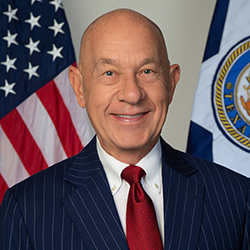He’s a liar.
Health Secretary Robert F. Kennedy Jr. says his “Make America Healthy Again” Commission report harnesses “gold-standard” science, citing more than 500 studies and other sources to back up its claims. Those citations, though, are rife with errors, from broken links to misstated conclusions.
Seven of the cited sources don’t appear to exist at all.
Epidemiologist Katherine Keyes is listed in the MAHA report as the first author of a study on anxiety in adolescents. When NOTUS reached out to her this week, she was surprised to hear of the citation. She does study mental health and substance use, she said. But she didn’t write the paper listed.
“The paper cited is not a real paper that I or my colleagues were involved with,” Keyes told NOTUS via email. “We’ve certainly done research on this topic, but did not publish a paper in JAMA Pediatrics on this topic with that co-author group, or with that title.”
It’s not clear that anyone wrote the study cited in the MAHA report. The citation refers to a study titled, “Changes in mental health and substance abuse among US adolescents during the COVID-19 pandemic,” along with a nonfunctional link to the study’s digital object identifier. While the citation claims that the study appeared in the 12th issue of the 176th edition of the journal JAMA Pediatrics, that issue didn’t include a study with that title.
As the Trump administration cuts research funding for federal health agencies and academic institutions and rejects the scientific consensus on issues like vaccines and gender-affirming care, the issues with its much-heralded MAHA report could indicate lessening concern for scientific accuracy at the highest levels of the federal government.
The Department of Health and Human Services did not respond to a request for comment on the report’s citation inconsistencies prior to publication of this story.
The anxiety study wasn’t the only one the report cites that appears to be mysteriously absent from the scientific literature. A section describing the “corporate capture of media” highlights two studies that it says are “broadly illustrative” of how a rise in direct-to-consumer drug advertisements has led to more prescriptions being written for ADHD medications and antidepressants for kids.
The catch? Neither of those studies is anywhere to be found. Here are the two citations:
Shah, M. B., et al. (2008). Direct-to-consumer advertising and the rise in ADHD medication use among children. Pediatrics, 122(5), e1055- e1060.
Findling, R. L., et al. (2009). Direct-to-consumer advertising of psychotropic medications for youth: A growing concern. Journal of Child and Adolescent Psychopharmacology, 19(5), 487-492.
Those articles don’t appear in the table of contents for the journals listed in their citations. A spokesperson for Virginia Commonwealth University, where psychiatric researcher Robert L. Findling currently teaches, confirmed to NOTUS that he never authored such an article. The author of the first study doesn’t appear to be a real ADHD researcher at all — at least, not one with a Google Scholar profile.
In another section titled, “American Children are on Too Much Medicine – A Recent and Emerging Crisis,” the report claims that 25% to 40% of mild cases of asthma are overprescribed. But searching Google for the exact title of the paper it cites to back up that figure — “Overprescribing of oral corticosteroids for children with asthma” — leads to only one result: the MAHA report.
The corticosteroids study’s supposed first author, pediatric pulmonologist Harold J. Farber, denied writing it or ever working with the other listed authors. He pointed to similar research he’s conducted, but said that even if the MAHA report cited that study correctly, its conclusions are “clearly an overgeneralization” of the findings.
“It is a tremendous leap of faith to generalize from a study in one Medicaid managed care program in Texas using 2011 to 2015 data to national care patterns in 2025,” Farber said in an email.
There’s more than that, from sloppiness to misstating conclusions and more. The story has an update at the end that the MAHA report was amended after their reporting to remove the seven references to reports that do not exist. Mistakes happen, and usually as long as they get fixed when they’re noticed it’s not a problem. This level of error suggests much bigger issues; former HHS Secretary Xavier Becerra called bullshit on the whole thing. Even if you could credibly assign it all to massive incompetence, it’s a terrible look for the agency and the authors of that report. And of RFK Jr, whose name is on it.
But as always, the chaos is the point.
Health and Human Services Secretary Robert F. Kennedy Jr. stunned federal health officials on Tuesday by abruptly announcing that the COVID-19 vaccine would no longer be recommended for children and healthy pregnant women—a major policy reversal reportedly made without input from the Centers for Disease Control and Prevention.
According to The Washington Post, agency officials were left scrambling after Kennedy dropped the news, not in a press release or internal memo, but in a video posted to X. That’s how CDC staff—and the rest of the country—found out.
This is literal life-and-death policy, yet Kennedy is treating it like a social media stunt.
Five hours after the video dropped, CDC officials finally received a one-page “secretarial directive” dated May 19—nearly a week earlier. It was signed by Kennedy but contradicted parts of his own video, deepening the confusion, according to multiple federal health officials who spoke to the Post anonymously.
In the video, Kennedy suggested he had unilaterally reversed CDC guidance recommending annual COVID shots for everyone six months and older, including healthy pregnant women. CDC officials told the Post that they learned about this “when it was tweeted.”
“People were scrambling to find out what it meant,” one federal health official said.
Kennedy also claimed the recommendations had already been pulled from the CDC website when they hadn’t. And how could they have been? Top CDC officials said they were blindsided, which is galling considering it’s the CDC’s job to issue that kind of advice in the first place.
As of Thursday, the CDC still recommended the COVID-19 vaccination for everyone six months and older, including people who are pregnant, breastfeeding, trying to conceive, or planning to get pregnant.
The directive, meanwhile, shared internally only after the fact, ordered the CDC to remove the COVID-19 vaccines from both the child and adolescent immunization schedule and the list of recommended vaccines during pregnancy. But its vague wording raised even more questions: Did Kennedy’s directive apply to all children, or just “healthy” ones?
“It’s unclear,” one official told the Post.
Adding to the disconnect, top officials at the U.S. Food and Drug Administration had just published a piece in the New England Journal of Medicine affirming that pregnancy is a high-risk condition for COVID-19 and a reason to get vaccinated, directly contradicting Kennedy’s claim.
The lying and misinformation go hand in hand with the chaos. And the bottom line is we’re all at greater risk because of RFK Jr.
The federal government announced Wednesday that it is canceling a contract to develop a vaccine to protect people against flu viruses that could cause pandemics, including the bird flu virus that’s been spreading among dairy cows in the U.S., citing concerns about the safety of the mRNA technology being used.
The Department of Health and Human Services said it is terminating a $766 million contract with the vaccine company Moderna to develop an mRNA vaccine to protect people against flu strains with pandemic potential, including the H5N1 bird flu virus that’s been raising fears.
[…]
Jennifer Nuzzo, the director of Brown University’s Pandemic Center, said the decision was “disappointing, but unsurprising given the politically-motivated, evidence-free rhetoric that tries to paint mRNA vaccines as being dangerous.”
“While there are other means of making flu vaccines in a pandemic, they are slower and some rely on eggs, which may be in short supply,” Nuzzo added in an email. “What we learned clearly during the last influenza pandemic is there are only a few companies in the world that make flu vaccines, which means in a pandemic there won’t be enough to go around. If the U.S. wants to make sure it can get enough vaccines for every American who wants them during a pandemic, it should invest in multiple types of vaccines instead of putting all of our eggs in one basket.”
The cancellation comes even though Moderna says a study involving 300 healthy adults had produced “positive interim” results and the company “had previously expected to advance the program to late-stage development.”
“While the termination of funding from HHS adds uncertainty, we are pleased by the robust immune response and safety profile observed in this interim analysis of the Phase 1/2 study of our H5 avian flu vaccine and we will explore alternative paths forward for the program,” Stéphane Bancel, Moderna’s chief executive officer, said in a statement. “These clinical data in pandemic influenza underscore the critical role mRNA technology has played as a countermeasure to emerging health threats.”
The administration’s move drew sharp criticism from outside experts.
“This decision puts the lives and health of the American people at risk,” said Dr. Ashish Jha, the dean of the Brown School of Public Health, who served as President Biden’s COVID-19 response coordinator.
“Bird Flu is a well known threat and the virus has continued to evolve. If the virus develops the ability to spread from person to person, we could see a large number of people get sick and die from this infection,” Jha said. “The program to develop the next generation of vaccines was essential to protecting Americans. The attack by the Administration on the mRNA vaccine platform is absurd.”
But totally on brand. And sooner or later there’s going to be a big mess to clean up. If it happens on RFK Jr’s watch, how much do you trust him to be able to handle it? Your Local Epidemiologist has some thoughts.
And finally, here’s your case count update.
The measles outbreak in Texas has grown by nine cases since the last update Tuesday, according to the Texas Department of State Health Services.
This brings the total new cases in the last week to 10 after one was reported Tuesday. The Texas health department estimates that less than 1% of the cases, or fewer than 10, are actively infectious. Measles is infectious four days prior to and four days after rash onset.
Since the outbreak began in January in Gaines County, located in West Texas along the state border with New Mexico, 738 cases of measles have been confirmed. Two school-age children, who were not vaccinated, have died during the outbreak. Ninety-four people have been hospitalized.
With 409 cases, Gaines County represents the vast majority of cases in the outbreak at 55.4%. Other counties with high case counts include Terry County, which neighbors Gaines, with 60 cases, and El Paso County with 57 cases. Lubbock County has 53 cases. Officials said the counties with ongoing measles transmission include Cochran, Dawson, Gaines, Lamar, Lubbock, Terry and Yoakum.
Another 32 cases have been reported that are not connected to the West Texas outbreak. This includes four cases in Tarrant County, two in Denton County, two in Collin County and one in Rockwall County.
Health officials earlier this week warned residents of measles exposure at four public venues in McKinney: a 24 Hour Fitness, the Cubana Grille, Market Street and the Moviehouse & Eatery.
Most of the confirmed cases have been children, according to DSHS. Children age 17 and under represented 495 cases, while children 4 and under represented 215 cases.
About 700 of the patients have been either unvaccinated or had an unknown vaccination status.
Ten cases a week continues to be the new normal. We also continue to get new reports of exposure in various public places, though so far none of them seem to have turned into super spreader events. I hope that luck keeps on holding up.
UPDATE: Slightly good news, but the chaos and uncertainty persists.
Days after Health Secretary Robert F. Kennedy Jr. announced that Covid shots would be removed from the federal immunization schedule for children, the Centers for Disease Control and Prevention issued updated advice that largely countered Mr. Kennedy’s new policy.
The agency kept Covid shots on the schedule for healthy children 6 months to 17 years old, but added a new condition. Children and their caregivers will be able to get the vaccines in consultation with a doctor or provider, which the agency calls “shared decision-making.”
The shots will also remain available under those terms to about 38 million low-income children who rely on the Vaccines for Children program, according to an emailed update from the C.D.C. on Friday.
Mr. Kennedy’s original pronouncement on Tuesday had caused an uproar among pediatricians and public health experts, who pointed out that very young children and pregnant women face high risks of severe illness from the virus. Many also worried that the new policy would prompt insurers and government programs to reduce or drop coverage of the cost of the shots.
The latest changes clarify coverage for healthy children older than 6 months. But they leave those highest-risk groups — pregnant woman and young infants who are covered by immunization during pregnancy — without a formal recommendation.
[…]
The policy changes on vaccines did not end uncertainty for pregnant women.
Last week, the Food and Drug Administration cited pregnancy as a high-risk condition that would qualify a woman for a Covid vaccine, which also contradicts the decision by Mr. Kennedy to drop pregnant women from the C.D.C.’s recommendations.
The dropped guidance for pregnant women is troubling to experts who point to research showing that the risk of stillbirth, preterm birth, hospitalization and death rises if pregnant women contract Covid.
Dr. Michelle Fiscus, a pediatrician and chief medical officer with the Association of Immunization Managers, said that she had expected a modified recommendation from the C.D.C. advising pregnant women to get the vaccine
“So that’s concerning,” she said.
On the C.D.C.’s website, the section on pregnancy and the Covid vaccine continues to urge pregnant and postpartum women to get the shot. If pregnant, women are “more likely to need hospitalization, intensive care or the use of a ventilator or special equipment to breathe if you do get sick from Covid-19.”
“Severe Covid-19 illness can lead to death,” the agency warns.
Who the hell knows with these malevolent idiots?
UPDATE: Of course the use of AI may be to blame for those citations of non-existent work. Of course.






















